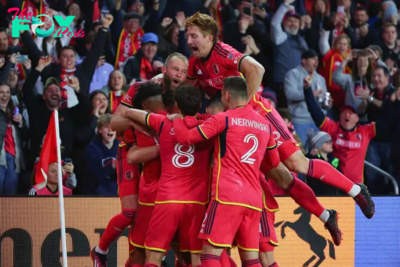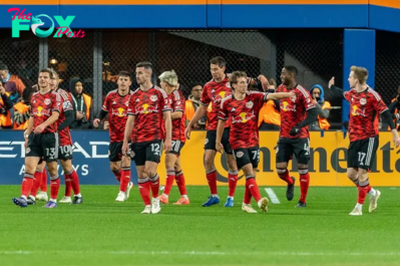Football
New Champions League format explained: How does 'Swiss' system work, number of teams, league phase
The UEFA Champions League as we know is about to change and it saw its final familiar group stage format played out earlier this season. We will not see another group stage scenario play out like that because of the changes to the current setup which will debut from the 2024-25 season.
The incoming format is known as the "Swiss" system and you will have likely heard it mentioned a number of times recently but you might also be wondering what it is and what it is about to mean for you and your team.
Here's everything to know:

Golazo Starting XI Newsletter
Get your Soccer Fix from Around the Globe
Your ultimate guide to the Beautiful Game as our experts take you beyond the pitch and around the globe with news that matters.
Thanks for signing up!
Keep an eye on your inbox.
Sorry!
There was an error processing your subscription.
Explain this "Swiss" thing
First of all, we should define exactly what the current format is. The current Champions League group stage sees 32 clubs split across eight groups of four with the top two teams from each group advancing to a knockout round of 16. The remaining field is then whittled down over two-legged round of 16, quarterfinals and semifinals until a single-game final between the last two teams left standing where the winner takes all.
From next season, that is all gone and a new structure will be put in place which -- in theory -- will result in greater entertainment with fewer "dead rubber" games between eliminated sides late in the current group stage which just finished with four clubs mustering three points or less across six games of soccer.
The new format, which has been dubbed the "Swiss" system, will feature 36 clubs in its group stage -- so four more than the current model -- and those teams will participate in one big table, which will now be known as the "league stage" instead of the group stage.
Three points for a win and one point for a draw is still the scoring method and fixtures will be arranged in a draw which sees the 36 teams organized across four pots of nine and every club will face two teams from each of the other pots. Teams will play eight games during this stage, up from six.
After eight games, the top eight will directly reach the round of 16 while teams in ninth to 24th will go into a playoff round which sees each tie play out over two legs. The playoff winners also make it to the round of 16 while the losers are eliminated along with the clubs that failed to make the playoffs. At that point, the familiar knockout format returns and the round of 16, quarterfinals, semifinals and final is the UCL roadmap that every competitor will be following.
Visualize it for me…
Breaking it down into its simplest format:
- A 36-team "league" ranked by a single table.
- With eight games played against two teams from four different pots.
- The top eight-ranked team advance to the regular UCL round of 16.
- Positions nine to 24 go into a two-legged play-off to reach the round of 16.
- Eight playoff winners continue in the UCL round of 16 while the losers are eliminated.
- Positions 25 to 36 are eliminated from all forms of European soccer for the season.
- Familiar two-legged knockout format of round of 16, quarterfinals and semifinals returns to produce two finalists.
Video: Explaining the format
UEFA explains the format in this video:
An exciting new era for European club Football awaits 🤩
— UEFA Champions League (@ChampionsLeague) March 4, 2024
Here’s how the #UCL will look from 2024/25 👇 pic.twitter.com/mEffFOpX2O
This happens next season?
Yes, the 2024-25 Champions League campaign will be the first ever to feature this new "Swiss" system so we are currently witnessing history play out as it is the final UCL edition to feature the traditional group stage of four teams with two advancing.
Why change it?
In theory, it kills off some of the less meaningful Games which often feature clubs which have already been eliminated before the end of the current group stage. The "Swiss" model follows similar formats to popular events such as ESports which has been crossing over with professional soccer for years already. However, claiming this as solely an organizational adjustment is not totally accurate -- more teams means more Games and more Games means more broadcast revenue. Basically, more money for all involved given that the current fixture format is going to balloon by over 60% with the new setup. This is not necessarily good news when you look at the worrying trend of serious injuries growing before this taxing new system has even been put into place.
So, expansion...
Yes, from next year onwards, the Champions League will have more clubs and more games, so there is no getting away from it being an expansion. Four new team slots in the "league stage" means more UCL qualification berths which logically brings in newer and bigger viewership which in turn brings us one step closer to a "super league" which traditional fanbases have been rallying against for years.
Is there still a qualifying round?
Yes. Before the league stage starts, there will be a first qualifying round featuring 30 teams from smaller leagues, a second qualifying round also featuring 30 teams, a third qualifying round featuring 20 teams, and then a play-off round of 14 teams, with seven spots up for grabs in the group stage.
Which teams have qualified for the league phase already?
- Manchester City (ENG)
- Arsenal (ENG)
- Liverpool (ENG)
- Aston Villa (ENG)
- Inter Milan (ITA)
- Milan (ITA)
- Juventus (ITA)
- Atalanta (ITA)
- Bologna (ITA)
- Real Madrid (ESP)
- Barcelona (ESP)
- Girona (ESP)
- Atletico Madrid (ESP)
- Bayer Leverkusen (GER)
- Stuttgart (GER)
- Bayern Munich (GER)
- RB Leipzig (GER)
- Borussia Dortmund (GER)
- PSG (FRA)
- Monaco (FRA)
- Brest (FRA)
- PSV (NED)
- Feyenoord (NED)
- Sporting Lisbon (POR)
- Celtic (SCO)
- Sturm Graz (AUS)
-

 Football35m ago
Football35m agoCCV And Kyogo Return, As Hoops look to go three clear
-

 Football36m ago
Football36m agoAberdeen Slip: Celtic’s Huge Tynecastle Chance
-

 Football41m ago
Football41m ago“A beautiful job to walk into” – Arne Slot’s Liverpool success in rival manager’s words
-

 Football41m ago
Football41m agoSouthampton manager confirms “2 of our best players” out vs. Liverpool
-

 Football2h ago
Football2h agoFormer Premier League defender to take charge of MLS team
-

 Football2h ago
Football2h agoNew York City FC 0-2 New York Red Bulls l: summary, score, goals, highlights | MLS Cup Playoffs
-

 Football5h ago
Football5h ago“Something I’ve Really Enjoyed” – Johnston Credits Rodgers After New Deal
-

 Football5h ago
Football5h agoJames Forrest Signs Celtic Contract Extension

























